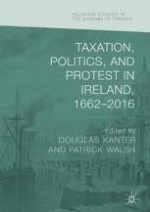2019 | OriginalPaper | Buchkapitel
12. The Economic War and the Pamphlet War
verfasst von : Aidan Beatty
Erschienen in: Taxation, Politics, and Protest in Ireland, 1662–2016
Aktivieren Sie unsere intelligente Suche, um passende Fachinhalte oder Patente zu finden.
Wählen Sie Textabschnitte aus um mit Künstlicher Intelligenz passenden Patente zu finden. powered by
Markieren Sie Textabschnitte, um KI-gestützt weitere passende Inhalte zu finden. powered by
